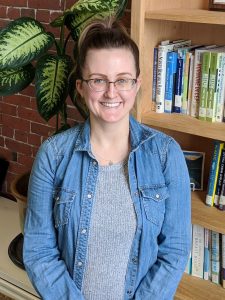Andrea Hindman joined SSEHRI in January 2018 as a T32 postdoctoral trainee.
What’s the main focus of your current research?
The main focus of my doctoral work examined the mechanisms by which hormonally active compounds disrupt normal estrogen signaling and mammary gland development. As a postdoctoral research fellow, at Silent Spring and SSEHRI, I look forward to applying my experience in molecular biology to devise adverse outcome pathways describing key events in mammary gland development that are vulnerable to later-life susceptibility and disease – specifically, breast cancer.
What is the most exciting or interesting part of doing this work?
The most exciting part of this work is the opportunity to work in a collaborative environment with the interest of breast cancer prevention and informing people of the steps they can take to reduce their risk. Obviously, it is so much better to be able to prevent cancer than to be in the position of fighting or treating it. We have pieces of information we know for sure about breast cancer risk and disease development, some things that have been well demonstrated in animal models and other things that have yet to be demonstrated well in order to connect human risk to what has been shown in these animal models. With new pieces of information available every day, it is important to take a step back, taking inventory of what we know and what we do not know, in order to make the best decisions for human health. This work also gives me a training opportunity to diversify my working knowledge of breast cancer risk and disease; the ability to delve into topics more generally in cancer biology, other environmental compounds that contribute to human disease risk and keep my hand on the pulse of current research efforts to these ends. Further, through collaboration with SSEHRI, I can fulfill a personal training gap and gain experience in communicating our findings to a broader audience whom are more personally affected or benefited by the implications of this work.
How does your work relate to SSEHRI’s mission?
Approximately 10-15% of breast cancers are heritable, leaving many factors of risk unknown. An increasing body of evidence implicates lifestyle and environmental exposures as a major contributor. This underscores the role people can play in their own health outcomes and a mode in which the field of toxicology and environmental science can use prediction as a tool for prevention. Thus, our work in identifying vulnerable mechanisms and periods of breast development, can inform the communication of risk to improve environmental health and fulfill the greater mission of SSEHRI. Ultimately, we hope to provide the information necessary and in a form that can be accessed easily by those responsible for making social and political changes, just as much as we hope to be a part of this collaborative effort through ongoing projects with SSEHRI.
